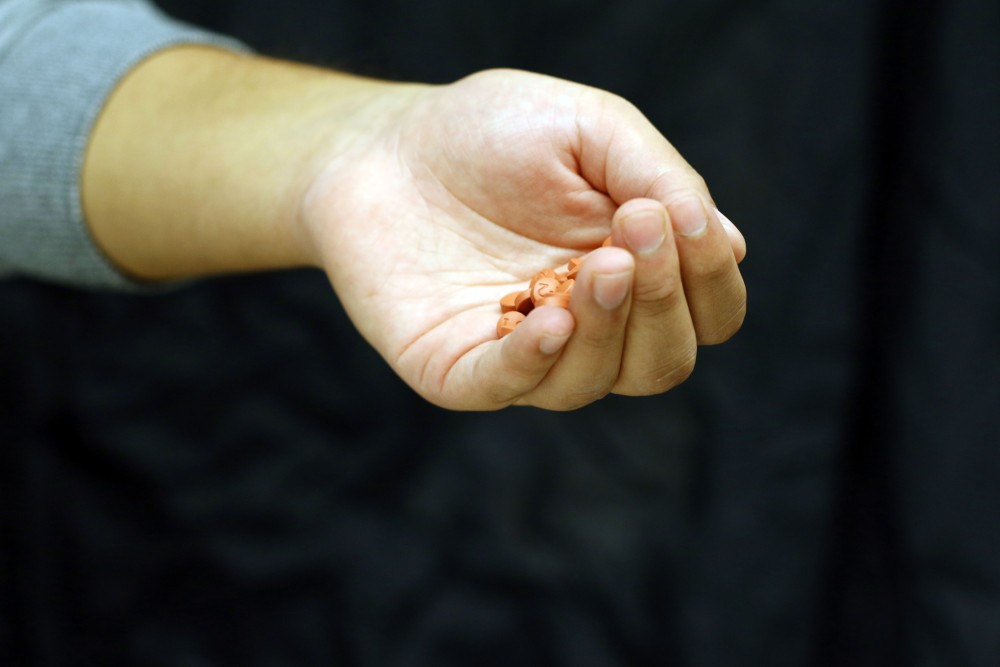Local organization reps respond to Trump’s opioid emergency declaration

GVL / Emily Frye Drugs…. on Wednesday November 1, 2017.
Nov 2, 2017
According to The New York Times, the opioid epidemic kills on average around 90 people a day and is the deadliest drug crisis in American history. On Thursday, Oct. 26, President Donald Trump took action against these staggering numbers and declared this opioid crisis a public health emergency.
While conducting a press release on the issue, Trump declared that something needs to be done about the country’s opioid epidemic.
“As Americans, we cannot allow this to continue,” Trump said Oct. 26 at the White House. “It is time to liberate our communities from this scourge of drug addiction. Never been this way. We can be the generation that ends the opioid epidemic. We can do it.”
The public health emergency declaration has sparked various reactions from those who deal with the opioid crisis on a daily basis. Brandon Hool, director of clean works, overdose prevention and response programming at The Grand Rapids Red Project, thinks money needs to be allocated to effective resources and existing providers so that those who currently have an opioid addiction can reach out for resources that have proven effective.
“I would hope that this is addressed just like any other disaster where is money allocated to resources, not new resources but to ones that have already been proven effective in addressing some of the issues that come along with the opioid epidemic,” Hool said.
The use for the money includes making sure that those who wish to seek help have the resources available to them, such as coverage under insurance and the ability to find somewhere to get treated without risk of coming across a lack of resources like detox beds, medicine and other treatment options.
Hool also thinks there needs to be a systematic approach to dealing with the epidemic itself in order to achieve the best possible outcome. Hool compared the opioid crisis to a sickness rather than a crime.
“You look at the smallpox epidemic, and they systematically worked as a network and figured out where the issues were coming up, and they addressed them with good medical procedures; they didn’t arrest the people who had small pox,” Hool said. “There were effective medical preventions with the best technology that we had. That’s what I hope to see, a science-based response.”
While the declaration does attract attention to the issue, the opioid epidemic isn’t necessarily a new problem in the U.S. Opioid addiction is a problem that surfaced in the 1990s when medical professionals began overprescribing painkillers like Oxycontin, resulting in a growing number of people becoming addicted to medications that fall under the opioid category. This isn’t a new concern, and The Red Project has been dealing with the epidemic officially since 2008.
“As far as overdose goes locally, we’ve lost a lot of people that are close to our program,” Hool said. “We’ve lost people that are close to our staff and to our volunteers. It kind of coincides with overdose awareness month that we’ve been made very aware of what’s going on. It hits home for us.
“For us, it’s just another day at the office. This is what we do every day of every year. We address drug overdose. We’re in the midst of it, and we have been since 2008. That’s what we do.”
Reginald Lott, director of program design and implementation at Matthew’s House Ministry, hopes that with this call for action come greater restrictions on the opioids as well as an increase in resources for those who are currently battling addiction.
“I would also like to see some positive restrictions on the pharmaceutical industry, adequate (assistance) for recovering addicts, and a social awareness campaign focused on prevention and intervention,” he said.
Lott and Matthew’s House unofficially declared November “Overdose Awareness Month” in Grand Rapids. In order to provide resources and support for those battling or those who know an individual battling opioid addiction, Mathew’s House is sponsoring many events during the month.
For more information on events for Overdose Awareness Month, contact Lott at [email protected], or visit the Matthew’s House website or The Red Project website for announcements on future events.





















